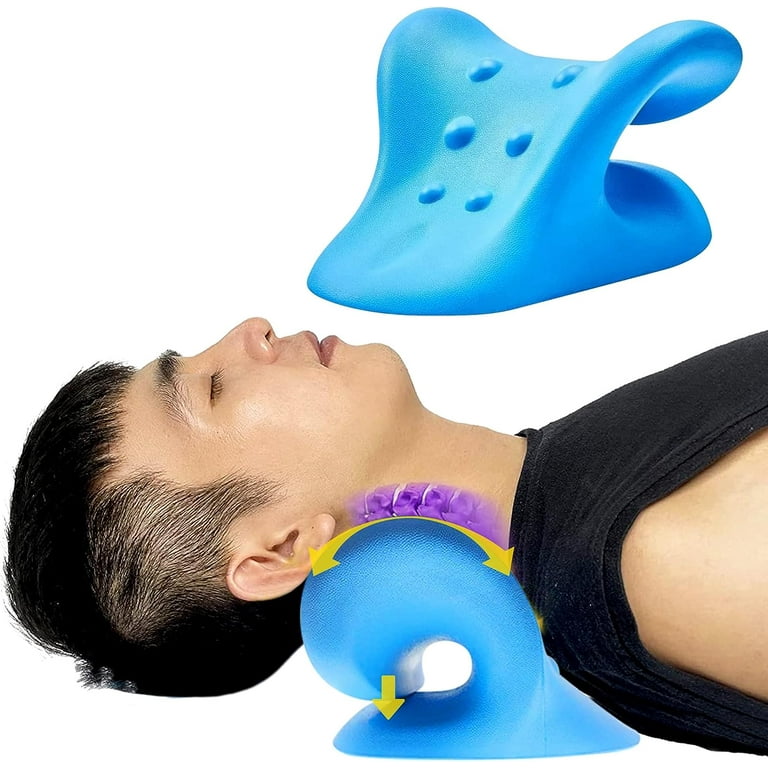Neck Cloud: Cutting-edge Support for Pain Alleviation and Better Posture
Neck Cloud: Cutting-edge Support for Pain Alleviation and Better Posture
Blog Article
The Influence of Tension on Neck Pain: Techniques for Lowering Stress and Pain
In today's hectic world, it's no trick that anxiety has ended up being a widespread variable in the onset and worsening of neck discomfort. Join us on a journey to unwind the impact of tension on neck pain and uncover effective means to reduce discomfort and enhance general high quality of life.
Comprehending Stress-Related Neck Discomfort
Stress-related neck pain can show up as stress, tightness, or pain in the neck and shoulder area. The link in between stress and anxiety and neck pain exists in the body's physical reaction to stress and anxiety, which can result in muscular tissue stress and tightness in the neck muscle mass.

Identifying Common Stress Locations
Regularly experienced by individuals under tension, tension areas in the body can offer useful understandings into the physical indications of psychological stress. One typical stress location is the neck, where stress and anxiety often manifests literally. Tension frustrations, rigid neck muscular tissues, and restricted array of movement are typical signs of stress-related neck stress. The shoulders are an additional typical location where stress gathers. Stress can create the muscle mass in the shoulders to tighten, bring about pain and discomfort. Additionally, the upper back is vulnerable to tension build-up, specifically in people who experience persistent stress. Poor pose and extended resting can aggravate stress in this area. The jaw is likewise an usual area for stress-related tension, as many individuals clench their jaw or grind their teeth when emphasized. Knowing these common tension areas can assist individuals identify the physical indications of anxiety and take actions to resolve them prior to they rise right into persistent discomfort or discomfort.
Carrying Out Relaxation Methods
Relaxation techniques are beneficial devices for minimizing neck discomfort caused by tension. Additionally, activities like yoga and tai chi incorporate both physical motion and relaxation, making them efficient practices for reducing tension and neck pain. By including these relaxation methods into your daily routine, you can assist take care of tension degrees, lower tension in the neck, and ease pain connected with stress-induced neck pain.
Including Self-Care Practices
Integrating self-care practices is important for keeping overall well-being and handling stress-related neck pain effectively. Participating in routine exercise, such as gentle stretching exercises or yoga, can aid ease tension in the neck and shoulders. Exercising excellent posture throughout the day and taking regular breaks from prolonged resting or screen time can also stop stress on the neck muscles.
Furthermore, prioritizing adequate rest and developing a constant rest routine can add dramatically to lowering anxiety degrees and advertising click for source leisure. Creating a relaxing bedtime regimen, such as checking out a publication or taking a cozy bathroom, can assist prepare the body and mind for relaxed sleep. Furthermore, maintaining a balanced diet regimen rich in nutrients and staying hydrated can sustain general health and lower inflammation that might aggravate neck pain.
Including mindfulness methods, such as deep breathing workouts or reflection, can aid handle anxiety and promote leisure. Taking time for oneself, involving in hobbies, and setting limits to secure individual time are additionally crucial elements of self-care that can contribute to minimizing tension and relieving neck pain.
Seeking Expert Help
How can people effectively resolve consistent neck discomfort that is influencing their everyday life and well-being? Looking for professional aid can be a vital action in managing and relieving neck pain. Consulting with healthcare professionals such as chiropractic specialists, physiotherapists, or orthopedic specialists can supply important insights and tailored therapy plans. These experts can perform comprehensive analyses to identify the underlying sources of neck pain and advise appropriate treatments.
Chiropractic specialists concentrate on back control techniques to improve positioning and lower stress in the neck location. Physical therapists use targeted exercises and stretches to enhance muscles, enhance adaptability, and boost general neck feature. Orthopedic professionals can give advanced clinical interventions such as shots or surgical alternatives for serious situations of neck pain.
Conclusion

Stress-related neck pain can manifest as tension, stiffness, or discomfort in the neck and shoulder area. The connection between stress and neck discomfort exists Full Report in the body's physiological reaction to stress, which can result in muscle stress and tightness in the neck muscles. Tension headaches, tight neck muscle mass, and restricted variety of motion are usual signs of stress-related neck stress. By incorporating these relaxation techniques right into your day-to-day routine, you can assist handle stress degrees, reduce tension in the neck, and alleviate discomfort associated with stress-induced neck pain.

Report this page